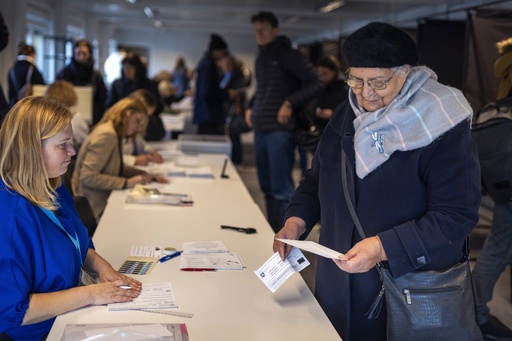VILNIUS, Lithuania — On Sunday, Lithuanians will cast their votes in the second and final round of parliamentary elections, with the conservative government still vying for re-election despite the leftist opposition making significant gains in the first round.
The popularity of Prime Minister Ingrida Šimonyt?’s government, which has been in power since 2020, has suffered due to strict COVID-19 policies, political scandals involving prominent cabinet members, and a recent surge in migrants crossing from Belarus.
This election, taking place against the backdrop of growing anxieties about the war in Ukraine and its implications for regional security, is critical for setting the political landscape for the next four years. While a shift to more left-leaning policies is anticipated, analysts suggest that there will likely be minimal alterations to Lithuania’s foreign relations, as the country remains a steadfast supporter of Ukraine and is aligned with NATO and the EU.
On Sunday, voters across various electoral districts will decide between the leading candidates from the first round, ultimately selecting representatives for the 141-seat parliament, known as the Seimas.
In the first round, the opposition Social Democrats, led by Vilija Blinkevi?i?t?, emerged with a slight advantage by securing 20 out of the initial 70 available seats, placing them ahead of Šimonyt?’s Homeland Union party. The center-left Democratic Union also made gains, capturing eight seats, while the two parties have expressed a desire to form a coalition with a smaller third party. Together, they currently hold 34 seats, committing to support each other’s candidates in the upcoming round.
However, the center-left’s dominance may not be guaranteed, especially as their ability to establish a stable government could hinge on the Nemuno Aušra party, which many view with skepticism. Having secured 15 seats, the party’s leader Remigijus Žemaitaitis was previously forced to resign due to antisemitic remarks, casting a shadow over potential coalitions. Should Nemuno Aušra perform well, it might provide the opportunity for the prime minister’s party to form a minority government.
“No one can claim a clear majority after the first round,” remarked Mažvydas Jastramskis, a political analyst at Vilnius University. Šimonyt?’s Homeland Union gained 18 seats, and its coalition partner, the Liberal Union, took eight. Despite having several candidates in the runoff, neither party appears poised to reach the 71 seats necessary for majority control.
Concerns about regional security coupled with domestic issues are weighing heavily on the mind of voters. Janina Kvietkauskiene, a retired librarian who voted early, expressed, “I backed those who will never look to the east; I don’t trust former communists or new populists.”
Before the elections, many traditional parties ruled out alliances with Nemuno Aušra, including the Social Democrats, who have declined to collaborate with Žemaitaitis’ group. Despite this, Nemuno Aušra has recently announced its intention to support Blinkevi?i?t? in her pursuit of the prime ministership.
Jastramskis pointed out the unlikelihood of the three center-left parties independently gathering enough seats to form a substantive government. “A more viable option for a stable majority is if Nemuno Aušra integrates into the proposed three-party coalition,” he stated, cautioning that continuing unacceptable rhetoric and actions could complicate governance.
